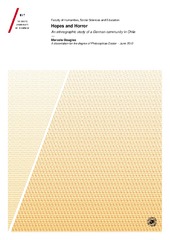Hopes and Horror - An ethnographic study of a German community in Chile
Permanent link
https://hdl.handle.net/10037/5810View/
Full thesis (PDF)
DVD ref 1 (QuickTime video)
DVD ref 2 (Unknown)
DVD ref 3 (QuickTime video)
DVD ref 4 (QuickTime video)
DVD ref 5 (QuickTime video)
DVD ref 6 (QuickTime video)
DVD ref 8 (QuickTime video)
DVD ref 9 soundtrack (Unknown)
DVD ref 10 soundtrack (Unknown)
DVD ref 11 (QuickTime video)
DVD ref 12 (QuickTime video)
DVD ref 13 (QuickTime video)
DVD ref 14 (QuickTime video)
Date
2014-02-21Type
Doctoral thesisDoktorgradsavhandling
Author
Douglas, MarcelaAbstract
The theme of the thesis is an exploration of how an utopian community can develop into totalitarianism, exemplified by a German religious community, formed after World War II, that emigrated to Chile in the early 1960-ies and gradually changed under the impact of political changes in Chile from the 1970-ies until today.
The problem is to explore how this development was brought about by the interplay between external factors – sentiments, ideologies and political conditions in the societies involved (Germany and Chile) – and internal factors – leadership psychology, organizational structure, values and beliefs, disciplinary methods, creation of a common narrative, methods for fostering loyalty, enthusiasm etc.
The main theory used is derived from Hanna Arendt`s studies of totalitarianism and the research literature following this tradition.
The research method is anthropological field work. The material is obtained through open interviews with informants from three generations of community members. Video recordings is used both as a medium for establishing trust between researcher and informants, and as documentation in its own right.
What the research process revealed was how mind control of the community members was executed through a penumbra of means, first of all through dissolution of normal family relations. Rigid roles for separate groups: men and women, small children, bigger children, teenagers, were important. Penal codes for misbehaviour, secrecy about the different disciplinary measures and systematic use of incriminating information about individuals, by the leadership group, was also part of this. A regime of hard physical labour, propagandistic use of cultural events and campaigns, and a strictly negative attitude towards intellectual interest and information about the world also contributed.
Publisher
UiT Norges arktiske universitetUiT The Arctic University of Norway
Metadata
Show full item recordCollections
Copyright 2014 The Author(s)
The following license file are associated with this item:


 English
English norsk
norsk
